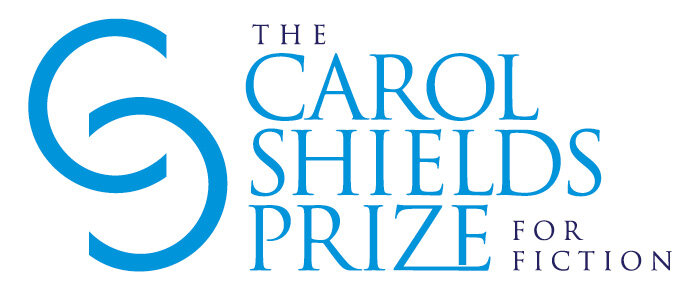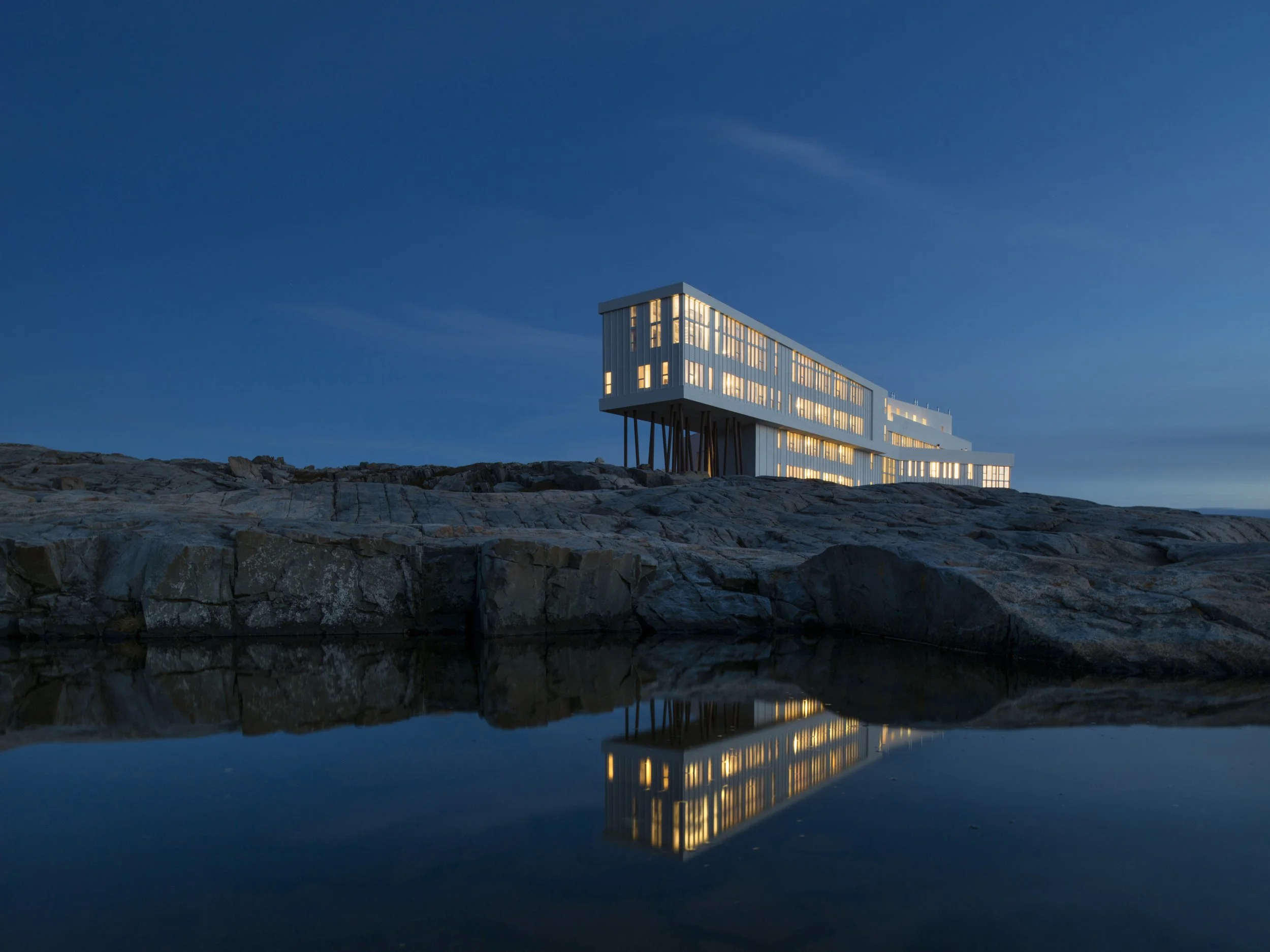How Art Saved Fogo Island: A Conversation with Zita Cobb
By Emily Donaldson
Photo credit: David Howells | Courtesy of Fogo Island Inn
The Carol Shields Prize for Fiction and the Fogo Island Inn have partnered in a mentorship program that includes a residency for one of the prize nominees and support for a local emerging female writer at Newfoundland’s famed, otherworldly Fogo Island Inn.
The Inn, and the many social and artistic initiatives associated with it are the brainchild of founder Zita Cobb and her charitable organization, Shorefast. An eighth-generation islander who became, at one point, the third-highest-paid female executive in the US, Cobb invested a significant portion of the fortune she amassed during those years into enterprises that now employ a third of Fogo Island’s residents, so it’s no exaggeration to say that she has singlehandedly turned the remote isle’s fortunes around. Not that she’d ever put it that way.
Warm and self-effacing, Cobb generally prefers to stay out of the spotlight; she was, however, willing take time to explain the genesis of the collaboration with the Carol Shields Prize for Fiction, her ideas about sustainable business, and her love of books and olives.
How did the collaboration between the Carol Shields Prize and the Fogo Island Inn come about?
I met Susan Swan a few years ago, and nobody says no to Susan Swan [laughs]. Anyway, I really loved what they're doing with the Prize and so I said yes, we will support it in any way we can. When I met Susan, it was an instant conversation – and I don't get many of these – about the way we live and how we're all walking along together. I’m generally drawn to art and artists and writers. I’m a businessperson by training, I come out of the finance world, but I find it's a suffocating place, and I don't think we're going to find answers there. I think the answers are on the outside.
I’m always interested in how humans relate to place – physical place, community – and if we can create a frame that invites people into our place and puts place back in. Because that's a big part of the problem: with the financial system we forgot about place, we forgot about geography, we also forgot about history. And it keeps coming back to get us every time.
Courtesy of Fogo Island Inn
What about the arts draws you, or has drawn you in the past?
It’s not an understatement to say that art saved Fogo Island from being resettled. Art in the form of the kind of the thinking of National Film Board filmmaker Colin Lowe, who put together a partnership with Fred Earle from Memorial University. We're talking ’66, ’67; I was born in ’58. The inshore fishery had collapsed and we had no running water, no electricity, no healthcare. My parents couldn't read and write, like many of their generation. But the biggest problem was that we were made up of ten different little communities and we didn't know each other. We had an enormous number of religious differences. I grew up Catholic, and I can tell you the priest did a damn good job of making sure we didn't go hanging out with any Protestants.
We didn't have roads and cars and we had no reason to go to other communities. In the language of economic development, you’d say we didn't have social capacity to engage with each other, to figure out what to do. And so along comes Colin and Fred and they didn't know what to do either. And that was good, because we’d just been visited by the government, who did know what to do, which was resettle everybody. [Lowe and Earle] just started asking questions and trying to understand. What they were practicing was what's now called asset-based community development. They were calling people to talk about, like, What do we know? We must know something. We must have something. What do we care about? And the big, motivating question was, What can we do about it? And because of the arrival of an outsider with such a neutral but provocative set of questions, people started to come together. I saw this happen as a kid and I was fascinated, because I watched how all this division just sort of dissolved. It was like overnight all the things people were angry about kind of went away. It was the weirdest thing.
Your dad had no literacy or formal education, but he was a brilliant man. Sending you away to study business was in itself genius. Surely you wonder all the time what he’d think of what you’ve done, are doing...
All the time.
...so what would he think of it? All these artistic initiatives?
I think islands by nature are a little more open than landlocked places to the outside world because you just never know when a boat's going to come into harbour. And he didn't much go to the outside world, other than to Labrador to fish and seal. But I think he would really enjoy the fact that Fogo Island has a relationship that's a little bit on its own terms. It's not mediated by the government in St John’s, which he never trusted for no reason than the whole resettlement program. Fogo Arts and the Inn have created a whole web of relationships that Fogo Islanders now have with people who live in other places. He always said: How can we ever find our place in the world if we don't know anything about it? He had a very deep social logic, which I think anybody who lives in a small place and who comes from centuries of people does. Newfoundlanders – outport Newfoundlanders in particular – are well described as sociable anarchists. So coming up with any form of coherent organization is always a challenge.
“What there is, and we need these things, there are institutions which are manifestations or representations of culture. But culture is a human response to a place. That’s where it’s born. That’s what it is.”
You’ve asked the question of how to harness value, the value of place and culture, say, without exploiting it.
It's an active act of balancing all the time. I don't think we properly understand culture. When I came to university in Ottawa I went home after the first year, and my teacher from high school said, Oh my god, there must be so much culture up in Ottawa. I remember at the time thinking, right, I guess there is. You have all these institutions, which are wonderful. But I’ve come to realize that this is not true: there's no more culture in Ottawa than there is anywhere else. What there is, and we need these things, there are institutions which are manifestations or representations of culture. But culture is a human response to a place. That's where it's born. That's what it is. And when you put it inside the National Gallery or you capture it in a play and show it at the National Arts Centre, that's a representation of culture. That teacher is dead now, but I wish I’d known then to say, No there's culture here. Culture is what happens when you send someone out in a little wooden boat on the north Atlantic.
You’re a reader?
I am a big reader yes. To a fault. It's a disease I think. It's a beyond a disease [laughs].
What do you gravitate to, or are you omnivorous?
I’m pretty omnivorous. I went to Ireland a few years ago for a little sabbatical for two months and I took a hundred books – I shipped some ahead – in three categories. In the morning I read finance and economics, and then I’d have lunch and go for a walk and come back and read something in art or culture, and then I’d have supper and read nonfiction. I read a lot of poetry, I don't read a lot of fiction, although I do love it. I just run out of time because I have this finance and economics job and it seems like every day of the week some economist or financial writer has figured out what the answer is to the mess we have. I haven't figured that out yet, but everybody's point of view adds to our understanding, so I try to keep up.
Courtesy of Fogo Island Inn
Who are your poets?
[Wisława] Szymborska is probably my favorite, but I have a pretty wide range. I love Billy Collins. Who's not happier after a Billy Collins poem? And Michael Crummey. His novels are amazing, but I think his poetry is even more so. Actually, my favourite poet is probably Gregory Corso – a lesser-known Beat poet.
I grew up in a house with no books. And I was not a kid that you would really want to babysit your kids [laughs], but I would babysit for the people next door – he was a teacher – because they had a set of encyclopedias. That's how I started reading.
Do you remember anything from them?
The geography. All the countries and all that happened in those countries and their history and their economy. That kind of stuff is what stays with me. I studied business at Carleton [University] and I took an elective in Canadian literature. And this was the most amazing thing, because I discovered authors I don't think most Canadians then knew existed, unless they were really well read. Like Percy Janes from Newfoundland. House of Hate was one of the books. Gabrielle Roy, The Tin Flute. Frederick P Grove, Margaret Laurence, Alistair MacLeod. It was all there in a first- or second-year Canadian literature course. And there are writers I want to read. Writers that everybody's supposed to like, and that I want to like. I really want to like George Saunders, and I haven't given up trying.
Well what's good is what you like. As with food...
I used to hate olives until I had a breakthrough. There's a quote from Jane Addams, a social housing activist from Chicago who won the Nobel Prize. She said nothing was worse than the fear that one had given up too soon and left one unexpended effort that might have saved the world. Now, you don't have to save the world, but that might have helped me get through George Saunders [laughs].
When was your olive breakthrough?
Age 13. There was a man who lived in our community who used to go on ships overseas as a deckhand, and he would always bring back things we've never had. I remember when I first tasted coffee... Anyway! He would bring olives and I thought they were the most vile thing, and then one trip he brought olives and I tried them again and it was like, Wow!
Black? Green?
They were black olives. From a can.
Pitted?
They weren't pitted. And they were from Spain. It was life-changing.



